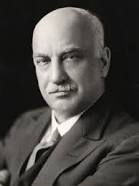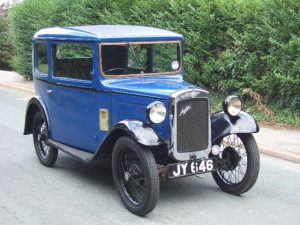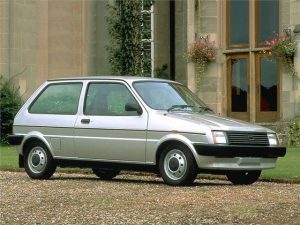The British Motor Car industry is famous for its illustrious marques and makes from the early 1900’s including Austin, Morris, Wolseley, Bristol., Triumph, Riley, Standard, Jensen, Reliant, Humber, Sunbeam ,Hillman Singer, Daimler. Sadly, not one of these car companies is still manufacturing. Andrew Swift gave us a fascinating insight into the history of the Austin Motor Company, one of our most famous volume car manufacturers.

The company was founded by Herbert Austin in 1905 using a derelict printing works in Longbridge, seven miles from Birmingham . He had been inspired by the possibilities of mechanical transport so much so he designed a 3 wheeler, powered by a horizontal 2 cylinder engine in 1895. In the period between 1908 and the outbreak of the First World War Austin’s firm grew quickly, manufacturing in-house designs but also manufacturing other firm’s vehicles, such as the first baby Austin, single cylinder, 7 hp tourer. The firm was expanding and production rose from 200 vehicles in 1910 to around 1100 in 1912. The Austin car company made a massive contribution to the war effort and took on all kinds of war contracts including, shells, artillery, lorries and aircraft. The factory was extended and the workforce grew from around 2500 to around 22000.
Herbert Austin received a knighthood in 1917 for his contribution to the war effort. Sadly, the firm went into receivership in 1921, partly because of the post war recession and partly because of new models which struggled in the market place. The company was restructured and austerity programme was agreed with the workforce which saw them through these difficult times. New cars launched in the 20’s and 30’s consolidated the company as a major, successful car manufacturer. In 1922, the 1661cc, 4 cylinder, ‘Twelve’ was launched which proved extremely popular due to its reliability and low price. However, the car which saved Austin was the Seven, designed by Austin himself with a draughtsman Stanley Edge.

The Seven was launched in 1922 and remained in production for 17 years, initially using a 696 cc engine and finally increased to 747cc. In total 375,000 ‘Sevens’ were produced before production ceased . In the 30’s Austin brought a whole range of models to the market, the most popular being the ‘Ten/Four’ introduced in 1932. with a 1125cc engine. Production ceased in 1947.
Austin Motors continued car production during the Second World War, also with lorries, and Avro Lancaster bombers. Commercial car production got under way immediately after the war, much to the annoyance of William Morris because Morris Motors had not produced cars during the war.
Relationship between the Austin Motor Company and Morris Cars was never harmonious, competing in the same market place with franchised dealers often in the same towns. Price cutting and fierce rivalry was the norm. There was also personal animosity between Herbert Austin and William Morris. The feud was not helped by the defection of Leonard Lord to Austin in 1938, having been M.D. of Morris Cars. Herbert Austin, by then Baron Austin KBE, died in 1941 to be replaced eventually by Leonard Lord in 1946.
Andrew Swift has a comprehensive collection of product and publicity brochures and used them to great effect by describing many of the models that Probus members had owned or driven in during the 60’s ,70’s and 80’s including the Austin A50 Cambridge, Mini, A35, Princess Limousine, Austin Taxi, 1100, 1800, A40 Saloon, Maxi, Allegro, Metro, Maestro and Montego.

In the 50’s , the British car industry was consolidating, merging and reducing such that the unbelievable happened in 1952 when with others, Austin Cars and Morris Motors merged to form British Motor Corporation ( BMC ). In 1966 Jaguar Cars was purchased and British Motor Holdings was formed. In 1968 the industry was further consolidated with the merger of British Motor Holdings and Leyland Motors Corporation to form British Leyland Motor Corporation with Donald Stokes as Chairman.
The brand name of Austin continued until the early 80’s but finally disappeared under the Rover badge. .
